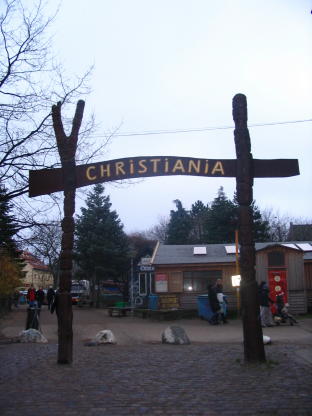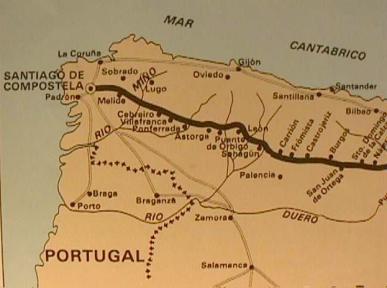We are developing the social individualist meta-context for the future. From the very serious to the extremely frivolous... lets see what is on the mind of the Samizdata people.
Samizdata, derived from Samizdat /n. - a system of clandestine publication of banned literature in the USSR [Russ.,= self-publishing house]
|

I have been a blogger for almost three years on my own blog and for about 18 months here at Samizdata. The nicest thing that has happened due to this is that it has allowed me to become connected and to meet a great many people I would not have met otherwise. Not the least of these are of course Perry, Brian, Adriana, Gabriel, David and the rest of the Samizdata team.
And of course links and comments come unexpectedly, from people with in widely dispersed places and from widely dispersed cultures with who one none the less discovers one has a fair bit in common. (When I write a travel article, it is always nice to be commented on and linked to by people native to the place I was writing about. And this often happens.
But being linked to is fun. Take for instance something that happened this evening. Looking at the refers to my personal blog, I discovered that I was listed in a page of links to expatriate blogs, that is blogs written by people living in places other than their native countries. This is fine and indeed good. I am certainly an expatriate. And expatriate blogs do have certain things in common. If you live in a country other than your own you do find that you look at things in a slightly different way than do natives, and you do have this in common with other expatriates, even expatriates from wildly different places and who are living in wildly different places.
And unsurprisingly the compiler of this list is an expatriate blogger himself. Like me, this blogger lives in London. However, whereas I am Australian, he is apparently German. (Actually, I have no idea whether it is a “he” or a “she”, but I kind of think the mindset is a male one. And of course he could be Austrian or Swiss). As he is writing in a language I do not understand, I cannot read the blog. But from the pictures, it is none the less obvious to me that the author of this blog is my kind of guy. And possibly also Brian’s kind of guy. And perhaps Jackie’s kind of guy.
Here is my mother’s new kitten.

Happy new year everyone.

I mean, what else does one need?
Update: Cool. God bless Texas.
These exciting and unexplained cleaning events have kept Opportunity in really great shape.
– Mars rover team leader Jim Erickson at NASA’s Jet Propulsion Laboratory in Pasadena, California, explaining that “something” has been cleaning the solar panels of the rover Opportunity while it was parked during the Martian night, and that as a consequence its power levels are much higher than was expected at this stage of the mission. Two observations. (a) It looks like the Martians are friendly. (b) I wish I could have “exciting and unexplained cleaning events” in my bathroom.
(Link via slashdot).
Home Secretary David Blunkett has resigned, which is probably a euphemism for “has been sacked”, over allegations that he used his power as Home Secretary to speed up visa applications of his mistress’ nanny and various other dubious things. (Sadly, he has not been sacked for his fairly successful attempts at abolishing the common law). David Carr will undoubtedly post a comment saying that things will be as bad or worse under a new Home Secretary / future Conservative Government / blah blah blah. He is probably right, but none the less, I salute the demise of this vile man.
On Saturday I found myself (as one does) in the “Freetown” of Christiana, an “alternative community” in Copenhagen in Denmark. An abandoned military barracks quite close to the centre of the city was inhabited by a large number of squatters in the early 1970s, and arfter decades of sometimes hostile, sometimes violent clashes between inhabitants and the authorities (often over drug use), the people of Christiana and the Danish authorities these days basically tolerate one another.
These days Christiana has become a major venue for such things as live music and other entertainment, and it contains an assortment of bars, cafes, art galleries, workshops selling a variety of craft goods, music related items, and a vast amount of cannabis also seems to be consumed in the area. Clearly the economy of Christiana is very largely funded by selling stuff to visiting people like me, but that is fine. (I am all in favour of people who want to sell stuff, and I am all for people being able to smoke or ingest anything they want). And like anywhere else, Christiana has a fair bit of municipal pride, with clearly demarcated signs indicating city limits.

(It is actually relatively difficult to document this post with pictures, as photography is discouraged in all of Christiana, and is prohibited entirely in the entertainingly named Pusherstreet, partly because of the questionable legality of some of the things being sold, and partly I suspect because this is a way of preventing Christiana from degenerating completely into a tourist circus, which is always a danger).
But clearly the local promoters of certain iconic pop-cultural properties believe that nearby walls are a good place to advertise. → Continue reading: Which culture do you most want to counter?
Yeah. I just realized something. Something that really never occurred to me before. We’re going to win.
– Buffy the Vampire Slayer. (Probably really Joss Whedon).
In which a Samizdatista wanders approximately along the northern road to Santiago and beyond, views some industry and some magnificent rugged coastal country, tries some regional cuisine, watches some football, and encounters an interesting individual while drinking port in Vila Nova de Gaia
In August I took a summer holiday starting out at San Sebastian and Pamplona more or less on the Spanish/French border, working my way west across pretty much the entire Atlantic coast of Spain, and then spending several days in Porto in northern Portugal. For some reason an urge to visit that part of the country had been developing in my head for quite a few months, and I wanted to get it out of my system by going there. Sometimes I will visit a place because there is one thing there that I feel I must see, but more often the reasons resemble the reasons why I choose to read a particular book. If I find that I find two or more unrelated recommendations of a book in places and unconnected as possible, even slight or in passing recommendations, then this will encourage me to read it more than a single, stronger, recommendation, or two recommendations from the same place. And going to northern Spain and Portugal was like this.

One thing was that I went to Cornwall in England last year and had a wonderful time. And Cantabrica and the Asturias and Galicia are in a way the Cornwalls of Spain – the last parts of Spain to become Spanish, places that are less well integrated than many other parts, places that are still at least a little bit Celtic, and places that retain a distinct regional character. Or so I was told. (And Spanish food is said to retain more regional culture than most places). And like Cornwall, there is lots of rugged and beautiful coast to see.
But while Cornwall has always been a remote and economically relatively poor part of England, the Atlantic coast of Spain is something else, because when Spain conquered and ruled America, this is where the ships sailed from. And the industrial heartland of Spain came into being in this area as well. And of course this is the base of the massive and much maligned Spanish fishing industry, at least by the people of Cornwall and parts of Canada. (And of course this is the fishing industry that may have reached North America well before Columbus sailed to the Carribean).
I was curious about another thing, possibly more trivial. One of Spain’s greatest and most famous football teams is Deportivo La Coruña, which comes from the city of La Coruña in Galicia, a city with a population of only 230 000. This makes La Coruña into almost the Green Bay, Wisconsin of Europe – a major sporting team in a seemingly minor city. I was curious about this, too, so I thought I would go and have a look. Football, culture, and nationalism are incredibly mixed up wherever you go in Europe, but in Spain this is as extreme as anywhere. For decades the great club Real Madrid were basically an arm of General Franco’s fascist government (and some would perhaps crudely argue that they are basically an arm of the Madrid government today) and cheering an opposing football team was often one of the few public ways of protesting the government that was available, and passions for football clubs in ethnic minority regions can often be extreme.
And there was the city of Santiago de Compostela, the destination of the great pilgrimage to the supposed burial place of the apostle St James, that was once a point through which Christians amongst other things demonstrated resistance to muslim rule of Spain.
And there was another question that vexed me. Spain officially has three minority languages: Catalan, Basque, and Galician. The nationalist issues that go with Catalan and Basque are well known (and I had been to both places before), but the Galicians have a lower profile. Alas, I am not a linguist, but at least some people had told me that Galician is mutually intelligible with Portuguese, so that Galicia is essentially the Portuguese speaking part of Spain. And I was curious about this, and whether Galicia felt Spanish or Portuguese. So I thought I would visit Galicia and northern Portugal and compare the two places.
And I had heard that Porto is a stunningly beautiful city, and I thought I would go and look for myself. And I am a big fan of the great fortified wine that both comes from and is named after the city of Porto.
So all these things came together, and had been making me want to visit. Finding myself with a couple of weeks before starting a new job, I bought a ticket to Bilbao and flew off. → Continue reading: An encounter on the lower Douro
Grown men, he told himself, in flat contradiction of centuries of accumulated evidence about the way grown men behave, do not behave like this.
– from So Long, and Thanks for all the Fsh by Douglas Adams.
(We miss you Douglas)
Because she’d never heard of me, she made the quite reasonable assumption that I was a Dante writer – one so new or obscure that she’d never seen me mentioned in a journal of literary criticism, and never bumped into me at a conference. Therefore, I couldn’t be making any money at it. Therefore, I was most likely teaching somewhere. All perfectly logical. In order to set her straight, I had to let her know that the reason she’d never heard of me was because I was famous.
– Neal Stephenson, describing an encounter with a “literary” writer in a quite wonderful interview over at slashdot. His answer to the question “In a fight between you and William Gibson, who would win?” is so magnificent that it would make me go and buy all his books if I didn’t own them already.
You think this is cool? Wait ’til you see SpaceShipTwo.
– The truly magnificent Burt Rutan, interviewed at space.com.
(via Instapundit)
|
Who Are We? The Samizdata people are a bunch of sinister and heavily armed globalist illuminati who seek to infect the entire world with the values of personal liberty and several property. Amongst our many crimes is a sense of humour and the intermittent use of British spelling.
We are also a varied group made up of social individualists, classical liberals, whigs, libertarians, extropians, futurists, ‘Porcupines’, Karl Popper fetishists, recovering neo-conservatives, crazed Ayn Rand worshipers, over-caffeinated Virginia Postrel devotees, witty Frédéric Bastiat wannabes, cypherpunks, minarchists, kritarchists and wild-eyed anarcho-capitalists from Britain, North America, Australia and Europe.
|



